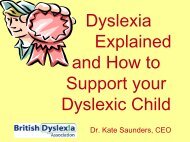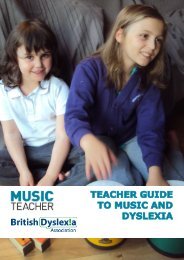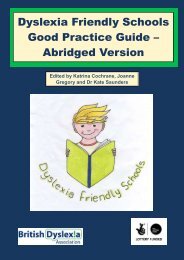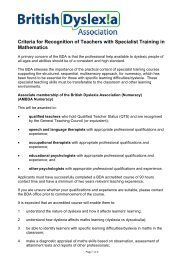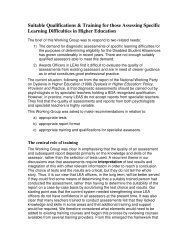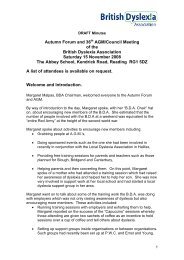Intervention for Dyslexia - The British Dyslexia Association
Intervention for Dyslexia - The British Dyslexia Association
Intervention for Dyslexia - The British Dyslexia Association
Create successful ePaper yourself
Turn your PDF publications into a flip-book with our unique Google optimized e-Paper software.
“<strong>The</strong> importance of early identification, assessment and provision <strong>for</strong> any child who may<br />
have special educational needs cannot be over-emphasised. <strong>The</strong> earlier action is taken,<br />
the more responsive the child is likely to be, and the more readily can intervention be<br />
made without undue disruption to the organisation of the school. Assessment should not<br />
be regarded as a single event but rather as a continuous process.”<br />
(DFES, 2001, Paragraph 5:11)<br />
<strong>The</strong> SEN Code of Practice also advocates the use of standardised screening or<br />
assessment tools, as well as a range of other sources of in<strong>for</strong>mation, in order to<br />
ascertain the extent and nature of a child’s special educational needs (DFES, 2001,<br />
Paragraph 5:13).<br />
<strong>Dyslexia</strong> screening tools use a range of subtests of different cognitive abilities that<br />
underpin literacy development and from which in<strong>for</strong>mation is combined to yield a<br />
conclusion that is of acceptable reliability and accuracy, although teachers need to be<br />
mindful of the limitations of such tests. <strong>The</strong> alternative technique of screening to identify<br />
children who are behind in reading development and using that as a basis <strong>for</strong><br />
determining which pupils should receive intervention is likely to be far less satisfactory if,<br />
in fact, the children have dyslexia. While it is accepted that children who are falling<br />
behind in reading should be noticed by teachers, and that appropriate action taken in<br />
such cases, nevertheless many dyslexic children slip through the net. Although the<br />
correlation between early reading ability and later reading ability is relatively high<br />
(usually in the region 0.6–0.7), poor early reading ability per se is not by itself<br />
necessarily a very good predictor of later literacy difficulties in individual cases (Fletcher<br />
et al., 2002b; Francis, 1992; Lerkkanen, Rasku-Puttonen, Aunola & Nurmi, 2004; Paris,<br />
2005; Singleton, Thomas & Horne, 2000). <strong>The</strong>re are several reasons <strong>for</strong> this. First,<br />
young children exhibit individual fluctuations in reading per<strong>for</strong>mance. Second, reading<br />
development is not a smooth, continuous process: children follow different paths or<br />
trajectories in learning to read. Trajectories of reading development are determined by<br />
many factors, including cognitive strengths and weaknesses, vocabulary knowledge,<br />
teaching approaches and reading materials employed, differential difficulty of subskills<br />
that have to be mastered (letter identification, whole-word recognition, phonics, etc.),<br />
and subskill interdependency (e.g. phoneme identification precedes blending and<br />
segmenting ability) (Paris, 2005). Children with reading difficulties tend to show<br />
particularly heterogenous trajectories of development (Lipka, Lesaux & Siegel, 2006).<br />
Consequently, it is possible <strong>for</strong> a child to have dyslexia but nevertheless to make<br />
sufficient early progress in word recognition to escape the teacher’s notice, and even to<br />
per<strong>for</strong>m within age-expectations on a standardised test of word reading. <strong>The</strong> use of<br />
investigative measures which are more sensitive to dyslexia, such as <strong>for</strong>mal or in<strong>for</strong>mal<br />
tests of phonic decoding skills, verbal memory and phonological awareness – which are<br />
key features of dyslexia screening and assessment batteries – can avoid such children<br />
slipping through the net.<br />
94 <strong>Intervention</strong> <strong>for</strong> <strong>Dyslexia</strong>



